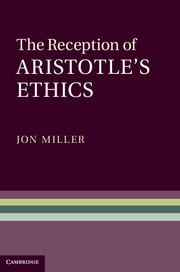Book contents
- The Reception of Aristotle's Ethics
- Contents
- Notes on contributors
- Acknowledgments
- A note on abbreviations and transliteration
- Introduction
- Chapter 1 The Nicomachean Ethics in Hellenistic philosophy
- Chapter 2 The transformation of Aristotle's ethics in Roman philosophy
- Chapter 3 Aristotelian ethics in Plotinus
- Chapter 4 St. Augustine's appropriation and transformation of Aristotelian eudaimonia
- Chapter 5 The Arabic and Islamic reception of the Nicomachean Ethics
- Chapter 6 Maimonides’ appropriation of Aristotle's ethics
- Chapter 7 The relation of prudence and synderesis to happiness in the medieval commentaries on Aristotle's ethics
- Chapter 8 Using Seneca to read Aristotle
- Chapter 9 Aristotle's Ethics in the Renaissance
- Chapter 10 The end of ends? Aristotelian themes in early modern ethics
- Chapter 11 Affective conflict and virtue
- Chapter 12 Kant and Aristotle on ethics
- Chapter 13 The fall and rise of Aristotelian ethics in Anglo-American moral philosophy
- Bibliography
- Index
Chapter 5 - The Arabic and Islamic reception of the Nicomachean Ethics
Published online by Cambridge University Press: 05 February 2013
- The Reception of Aristotle's Ethics
- Contents
- Notes on contributors
- Acknowledgments
- A note on abbreviations and transliteration
- Introduction
- Chapter 1 The Nicomachean Ethics in Hellenistic philosophy
- Chapter 2 The transformation of Aristotle's ethics in Roman philosophy
- Chapter 3 Aristotelian ethics in Plotinus
- Chapter 4 St. Augustine's appropriation and transformation of Aristotelian eudaimonia
- Chapter 5 The Arabic and Islamic reception of the Nicomachean Ethics
- Chapter 6 Maimonides’ appropriation of Aristotle's ethics
- Chapter 7 The relation of prudence and synderesis to happiness in the medieval commentaries on Aristotle's ethics
- Chapter 8 Using Seneca to read Aristotle
- Chapter 9 Aristotle's Ethics in the Renaissance
- Chapter 10 The end of ends? Aristotelian themes in early modern ethics
- Chapter 11 Affective conflict and virtue
- Chapter 12 Kant and Aristotle on ethics
- Chapter 13 The fall and rise of Aristotelian ethics in Anglo-American moral philosophy
- Bibliography
- Index
Summary
The Graeco-Arabic translation movement
In one of his works of literary criticism, the Syrian scholar Ṣalāḥ al-Dīn Khalīl ibn Aybak al-Ṣafadī (1297–1363) included a short passage which has attracted the attention of modern scholars studying the Greek legacy of Arabic intellectual culture. The passage begins with a statement concerning the interest of the Abbasid caliph al-Maʾmūn (reg. 813–33) in Greek books which he had translated into Arabic. As is well known though, Ṣafadī continues, the first person who produced such translations was the Umayyad prince Khālid ibn Yazīd ibn Muʿāwiya (c. 668–c. 704 or 709) who had a passionate interest in alchemy. Most modern scholars agree that this pioneering role of Khālid is not more than a legend. Nevertheless, Ṣafadī's account includes a number of details which find ample confirmation in independent sources.
Neither Ṣafadī nor any other medieval author provided a more comprehensive explanation why the Abbasid caliphs should have been interested in having Greek works on philosophy and science translated into Arabic. Modern scholars have speculated about their motivations. Some explanations emphasize practical benefits of scientific works as a starting point. Once they had a taste of the ancient sciences, the Arabs continued to translate. Another explanation focuses on intellectual curiosity and the challenge which the philosophical systems of ancient Greece may have presented. Related to this is the suggestion that philosophical methods of arguing were convenient for the emerging class of Muslim theologians who defended their religious doctrines against Christians and other non-Muslims.
- Type
- Chapter
- Information
- The Reception of Aristotle's Ethics , pp. 85 - 106Publisher: Cambridge University PressPrint publication year: 2012
- 3
- Cited by

